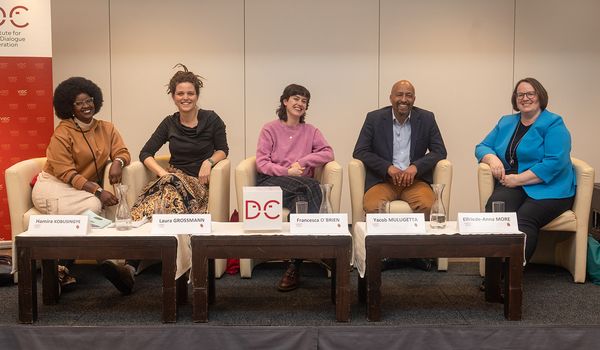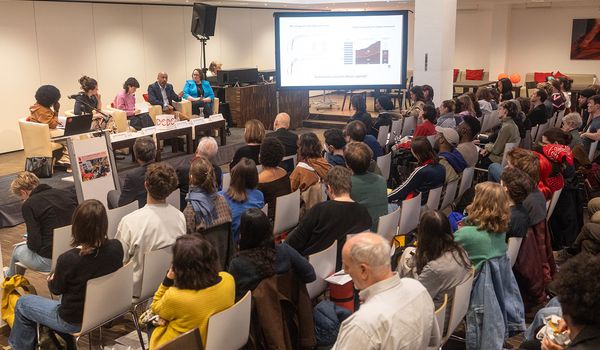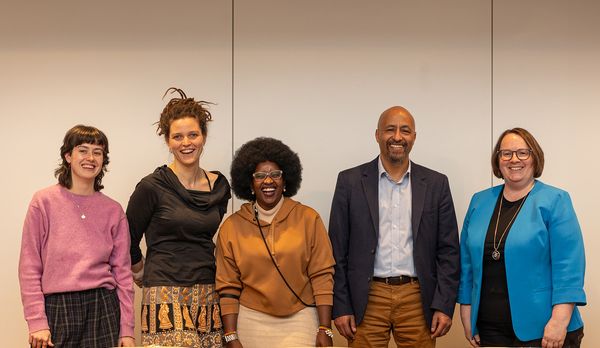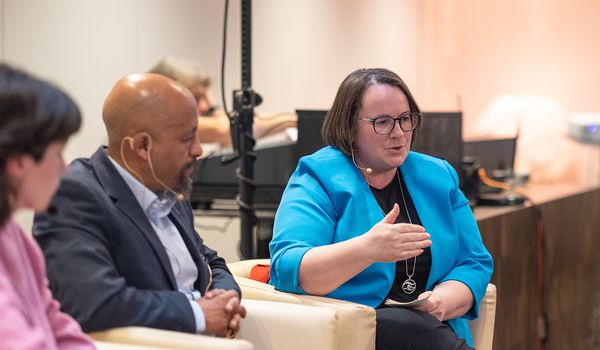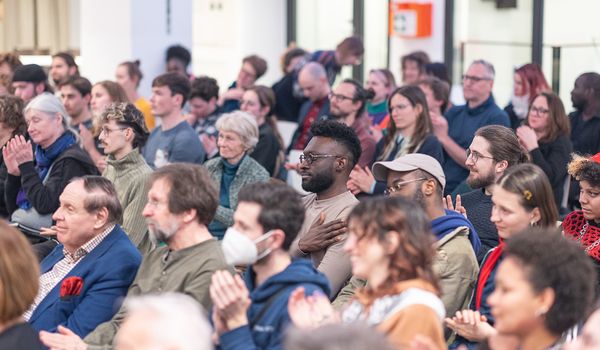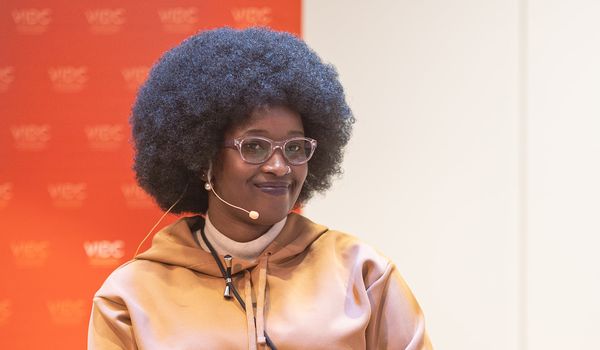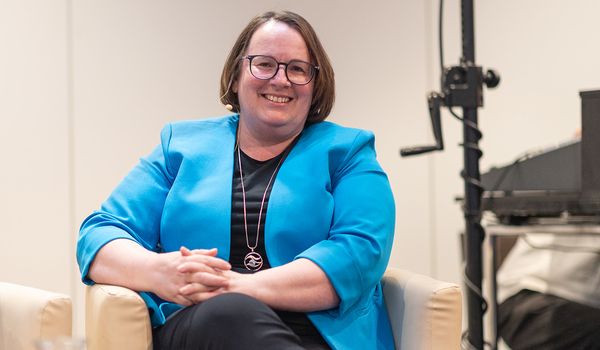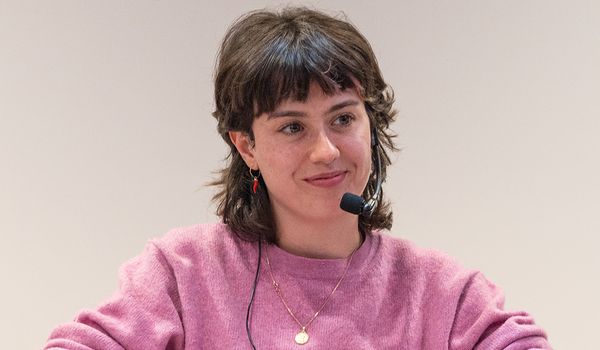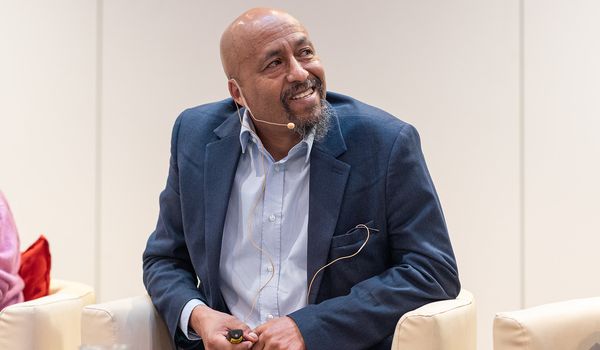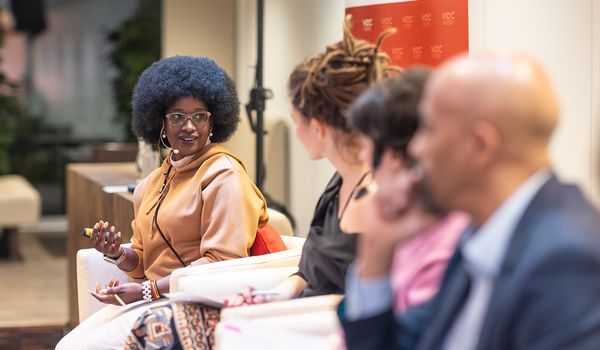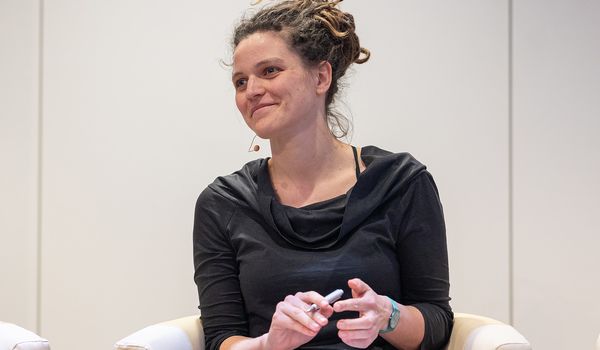Through its panelists of various backgrounds, the lively panel discussion brought together scientific, activist, and policy perspectives on global climate justice. The event was held by the VIDC in cooperation with the ‘People’s Summit Vienna’. Laura Grossman moderated the evening. Franz Schmidjell from the VIDC welcomed over 100 visitors and emphasized the urgency to talk about global climate justice: “While Austria's per capita CO2 emissions are around 7 tons per year, a person in Uganda emits only 150 kilograms. However, the people of Uganda, particularly women, are suffering from the catastrophic consequences of the climate crisis.”
Consequently, activists both from Africa and Europe criticized the inequitable economic and political system. Despite Europe's efforts to shift from fossil fuel-based energy to renewable sources, the urgency of the climate crisis persists. Furthermore, Europe's 'green' energy transition relies on continued ecological and social exploitation in Africa. Meanwhile, many political leaders in Africa persist in following the outdated path of fossil industrialization. Yet, researchers emphasize that Africa boasts abundant renewable energy resources such as solar, wind, hydro, and geothermal power, which could alleviate energy poverty and drive economic growth.
Hamira Kobusingye, Climate Justice Africa: An insight into current imbalances
As the founder of Climate Justice Africa, Hamira Kobusingye, a climate and gender justice activist, addressed two critical issues. Firstly, she highlighted the lack of climate-related information among African civil societies, and secondly, she discussed the impact of the East African Crude Oil Pipeline (EACOP). Climate Justice Africa aims to disseminate knowledge about the climate crisis to communities, emphasizing the need for future generations to live sustainably. Awareness building or collecting plastics for recycling may be small things done by small people but the number of people engaging in climate issues is rising. Kobusingye underscored the rising engagement in climate issues, which amplifies the voices of affected communities alongside challenging the interests of large corporations causing ecological and social issues in the Global South.
Regarding EACOP, Kobusingye exposed the harm caused by the current economic and political systems, where the project primarily benefits foreign entities like the French oil company TotalEnergies and the China National Offshore Oil Corporation, rather than Uganda and Tanzania. Those countries only receive 15% of the created wealth. At the same time the project causes social and health issues such as displacements of people as well as water and air pollution, causing diseases. Kobusingye urged collective action against neo-colonialism, highlighting the significance of global solidarity between the Global South and North. The importance of international activism was underscored during the debate by a notable example. Following a rally by Fridays for Future in front of the factory, the Austrian company ISOPLUS announced its withdrawal from the EACOP consortium.
Francesca O’Brien, People’s Summit against European Gas Conference: Rethinking development, reshaping politics
Francesca O’Brien, as speaker of the People’s Summit, followed up on Kobusingye by talking about the protest of the People’s Summit against the European Gas Conference. The Summit's primary objective is to underscore alternatives to the prevailing capitalist paradigm. Throughout the Summit especially the people most oppressed by the current system shall be heard. O’Brien emphasized that Gross Domestic Product (GDP) should not be the sole metric in discussions on development. This kind of economic growth as well as national borders need to be considered less important. Instead, she advocated for a more holistic approach that prioritizes ecological sustainability and global equity if the system is to become ecologically and globally just. The system should be human-need-based instead of profit-based.
As the Summit brings together people from the Global South and the Global North, O’Brien additionally talked about the challenges of exercising solidarity. She asked, how can people meet on eye-level if the power system they are embedded in is imbalanced? In connection with this, O’Brien mentioned the importance of a new democratic and participatory practice. Political participation must not be restricted to those who own power but must be expanded to all people, including those who are currently oppressed. A sustainable transition in the Global North cannot be just as long as it relies on the exploitation of the Global South. Achieving development in the Global South necessitates a reduction in consumption levels in the Global North.
Yacob Mulugetta, Professor of Energy and Development Policy (University College London): Structural challenges to African sovereignty
The Just Transition Africa Report in 2023 calls for a holistic decolonization of the current system. The report received support from civil societies as well as political decision-makers, said Yacob Mulugetta, one of the co-authors of the report. At the center of that demand lies the need for an African Strategy instead of African countries remaining a part of Europe’s strategies. There are several structural challenges connected to a sustainable transition in Africa. Africa has a big potential for sustainable energy production, as the report states. Yet, this potential needs to be turned into actual capacity. Currently, only 0.34 % of the renewable energy potential is utilized and over 600 million African people do not have access to modern energy. Africa has been spending more on imports than they receive from their exports. African countries are often dependent on food and energy imports. The African borrowing costs are eight times higher than those of Austria. Therefore, African agency and ownership are key factors. Africa’s sustainable transformation needs to be connected to a broader development plan. Energy must be democratized, based on negotiations that include various actors of the society. Food and sustainable energy sovereignty are crucial.
Mulugetta further emphasized that Africa contributes the least to the climate crisis compared to Europe. However, he cautioned against solely focusing on national comparisons. He noted that not everyone in the Global North is rich, but particularly those who are wealthy bear a significant responsibility. Mulugetta highlighted the universal nature of development, stating that no country can claim to be truly developed in terms of energy. He underscored the necessity for all nations to undergo transformation to attain sustainable development.
Elfriede-Anna More, Deputy Director General for Climate and Energy at the Austrian Ministry for Climate Action: Just Transition as a marathon
Elfriede-Anna More, Deputy Director General for Climate and Energy at the Austrian Ministry for Climate Action, points out that we still have a long way to go. The ministry aims to support the sustainable transition in Africa by working together with local initiatives connected with civil society. Instead of simply transferring technology to the Global South, technological know-how should be attained and exercised locally. The production of sustainable energy in the Global South should benefit local communities the most.
Austria tries to transition away from Russian gas imports and its fossil fuel dependency. Yet, politicians could only set incentives for economic players to follow up on that transition. Everyone, also players of liberal markets, need to commit to a sustainable and just transition.
Conclusion: Everyone has a part to play
Throughout the concluding discussion, the significance of political engagement became increasingly evident. Political leaders both in the Global South and the Global North possess the agency to embrace equitable alternatives. Europe must cease its support of corrupt political structures in Africa, prioritizing the well-being of local communities over self-serving wealth accumulation. Conversely, political leaders in Africa must prioritize the interests of their communities. Mulugetta underscores the importance of empowering communities to take action, emphasizing that change can emerge from grassroots collective efforts. Change can derive bottom-up from collective action. As Kobusingye put it, we all have a part to play in this transition. Only until we have played our part, as best as we can, we will see change.

